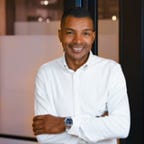Justice: A journey, not a destination
Must the balance of America’s soul, Black futures, racial equity, hang in the balance of one man’s judgment?
The day Derek Chauvin was found guilty of George Floyd’s murder, the sun shone hot in the nation’s Capital. The air already smells like summer here — cutgrass, black currant, barbecue. The chuff of police helicopters hovering over the city in the lead-up to Chauvin’s verdict added a familiar summer soundtrack. In most American cities, the choppers are a reminder that everyone beneath the mechanical birds is being watched in all of their warm-weather glory- a reminder not to get too excited.
But the reminder, as it turns out, was not necessary on April 20, 2021. Not just because the right verdict — against all odds — was served to Chauvin, staying the feet of readied protestors. Excitement was tempered because Black America has been here before, vulnerable in our hope. We know when to fight. We know when to rejoice quietly. It would feel good to celebrate this victory as a slam dunk for justice. It would feel good to believe that change is indeed going to come while it’s been a long time coming. But we have seen how slowly real policy reform happens. We’ve seen how quickly the pendulum can swing in this country from progress to regress. From hope to disempowerment.
Chauvin was convicted of second-degree unintentional murder, third-degree murder, and second-degree manslaughter. These are charges that required a delicate parsing of Chauvin’s intent from Floyd’s brutal death. And on the other hand, charges were shaped by the ham-handed tactics of dehumanizing and victim-blaming Floyd. These are old standbys when a Black man’s life hangs in Lady Justice’s balance. Lest we forget, Floyd pleaded for his mother in the final minutes of his life. Yet, it was Floyd’s dignity that was called into question during the trial. Floyd’s killing was captured on video by a seventeen-year-old who had the unfortunate understanding that she was witnessing a murder.
If you too, like me, are conflicted in your feelings about Chauvin’s verdict, about the future, know that there is truth and power in the complexity of your emotions. — Kevin Dedner, CEO of Hurdle
I spent the entirety of April 20, 2021, in recorded conversations on podcasts and conferences talking about black mental health, the pandemic, and George Floyd. I talked about America in the wake of Floyd’s killing, the quiet aftermath of Summer 2020’s global protests under the banner of Black Lives Matter, and the trauma of oppression. I made it a point to mention the upticks in depression and anxiety amongst People of Color since Floyd’s murder and under the deadly thumb of Covid. As CEO of Hurdle, a culturally responsive teletherapy platform, many of my days over the past three years have required me to carry the water when it comes to raising awareness about racism’s impact on the mental health of Black and Brown Americans. I often pull from my own story in these conversations. It is a story about how a deep depression gripped my mind, arriving slowly, then suddenly, coming in seasonal waves.
Until Geoge Floyd’s death, I often felt like I was yelling into a black hole when I shared my story and the story of Hurdle. I talked about racial trauma and its generational impacts and the need to revolutionize our mental healthcare system to honor race and culture. After Floyd’s murder, and as the world turned slower under the weight of the pandemic, it appeared the country was ready to listen.
So this week, as every news outlet and social media stream floods the virtual airwaves with commentary on Chaunvin’s verdict, I must confess: I am unsure of what I feel. Because the truth is it feels like sadness where satisfaction should be. Must the illusion of progress always cost so much? Must the balance of America’s soul, Black futures, racial equity, hang in the balance of one man’s judgment? In all of his privileged imperfections, Chauvin played the part of a perfect scapegoat, symbolizing what it might look like to right our flawed systems in the name of justice. But Chauvin’s guilt does not cleanse America from her racial sins. One reckless cop has been removed from the streets. But it won’t shock a system that is cemented in policies and practices that teach its enforcers to fear dark bodies like my own. In the words of Minnesota Attorney General Keith Ellison, Chauvin’s guilt offers accountability en route to justice.
Summer looms, as does the first anniversary of George Floyd’s death. As will the police choppers in the skies of every American city this summer in an attempt to temper any heated excitement over progress. Or, lack thereof. If you too, like me, are conflicted in your feelings about Chauvin’s verdict, about the future, know that there is truth and power in the complexity of your emotions. The jubilee of justice will always feel ‘just past the horizon so long as we believe justice is a destination, rather than a journey. On this journey, know this: We can reclaim a steadfast joy from within, even if the world around us lacks luster. We can rejoice — for the accountability that was birthed from Chauvin’s verdict, and still be quietly apprehensive about our fragile hope for even greater change.
Kevin Dedner, MPH serves as Founder and CEO of Hurdle (formerly Henry Health). Hurdle is mental healthcare for invisible barriers. As the leading culturally intentional mental health provider, Hurdle provides a comprehensive suite of mental health services and self-mastery tools to employers and payers to meet the needs of their employees and members.
